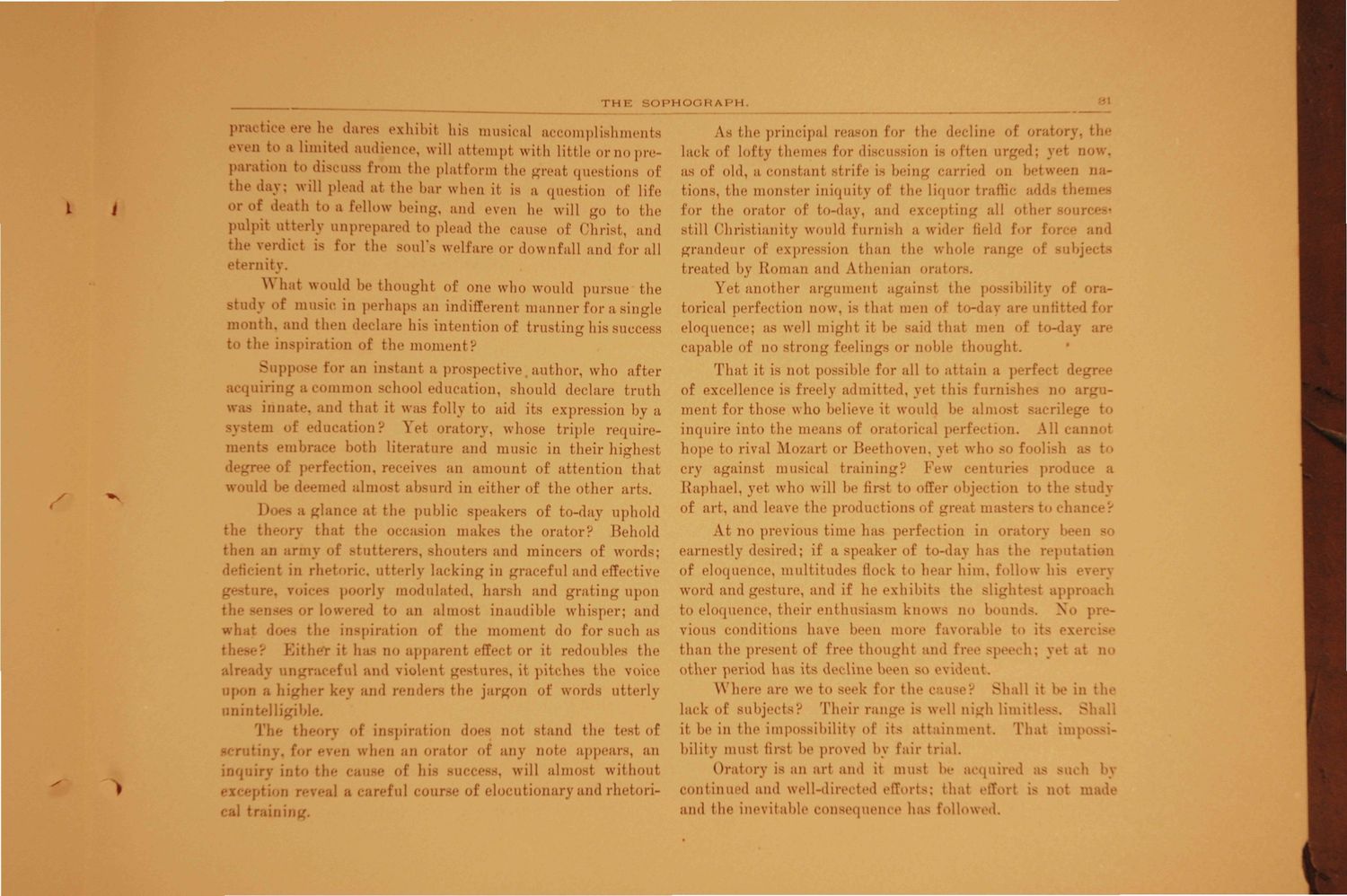| |
| |
Caption: Sophograph - 1890
This is a reduced-resolution page image for fast online browsing.

EXTRACTED TEXT FROM PAGE:
T H l ' " HOGRAPH. practice ere he dares exhibit his musical accomplishments even to a limited audience, will attempt with little ornopreparation to discuss from the platform the great questions of the day; will plead at the bar when it is a question of life T of death to a fellow being, and even he will go to the pulpit utterly unprepared to plead the cause of Christ, and the verdict is for the soul's welfare or downfall and for all eternity. What would he though! of one who would pursue the ndy of music in perhaps an indifferent manner for a single month, and then declare his intention of trusting his success the inspiration of the moment? Supp r an instant a prospectn author, who after acquiring a common school education, should declare truth was irinai ind that it was folly to aid its expression by a ystem of education? Vet oratory, whose triple requirements embrace both literature and music in their highest d f pert* i<»u. receives an amount of attention that v, ild be deemed alnn absurd in either of the other arts. 1' s s ance at the public speakers of to-day uphold tl >ry that the occasion makes the orator? Behold ti i an army of ,-tutt ire, shouters and mincers of words; ficient in rhe . utterly lacking in graceful and effective gesture, roic p rly modulated, harsh and grating upon < tl ase >r low.-n-d to an almost inaudible whisper; and wh does the inspiration of the momenl do for such as ie*v Kit has no apparent effeci or it redoubles the airrraceful and violent gestui . it pitch< the voice poi key and renders tie- jargon of words utterly lligible. I >ry of inspiration do.-- not stand the test of n when an orator of any note appeare, an liry in' be cause of his su< will almosi without , rful con elocutionary and rhetori- A.s the principal reason for the < line of orator., tin i lack of lofty themes for discu • is oft.-n urged; ; n . as of old. a constant siv\\>- is being carried on bet v n nations, the monster iniquity of the liquor traffic add- themi for the orator of to-day, and excepting all other still Christianity would furnish a wider field for foi am grandeur of expre ion than the whole range of subj< treated by Roman and Athenian orator-. Vet another argument again the p ribility of ora< torical perfection now. is that men of to-day are unlit dfor eloquence; as well might it be -aid that men of to-daj capable of no strong feelings or noble th< _rht. That it is not possible for all to attain a perfe degl of excellence is freely admitted, yel thi urnishes no ai ment for those who believe it would be almo>t - rilege to inquire into the mean.- of oratorical peri tion. All hope to rival Mozart or Beethoven, \ who as cry against musical training? Few centuries ; e a Raphael, yet who will be firsi t > offer objection to tie study < of art, and leave the productions of gre mi in< At no previous time has pert', ion in or. >ry been so earnestly desired; if a speaker of to-day hi be re] n of eloquence, multitudes flock to hear him. follow his • word and gesture, and if he exhibit- the sligh apj to eloquence, their enthusiasm knows no 1 is. No pn vious conditions have b n more favorab its than the present of free though ind fn D other period has its decline 1 in so < dent. Where are we to seek for the cau Shall v in tl lack of subjects? Their range i< well nijrh lin -. S it be in the impossibility of !*< attainment. That nposs bilitv must firsf be proved bv fair trial. Oratory is an art and it musi be acquired as - . 1 continued and well-directed efforts; thai effort i> t n le ami the inevitable consequence has followed. »
| |